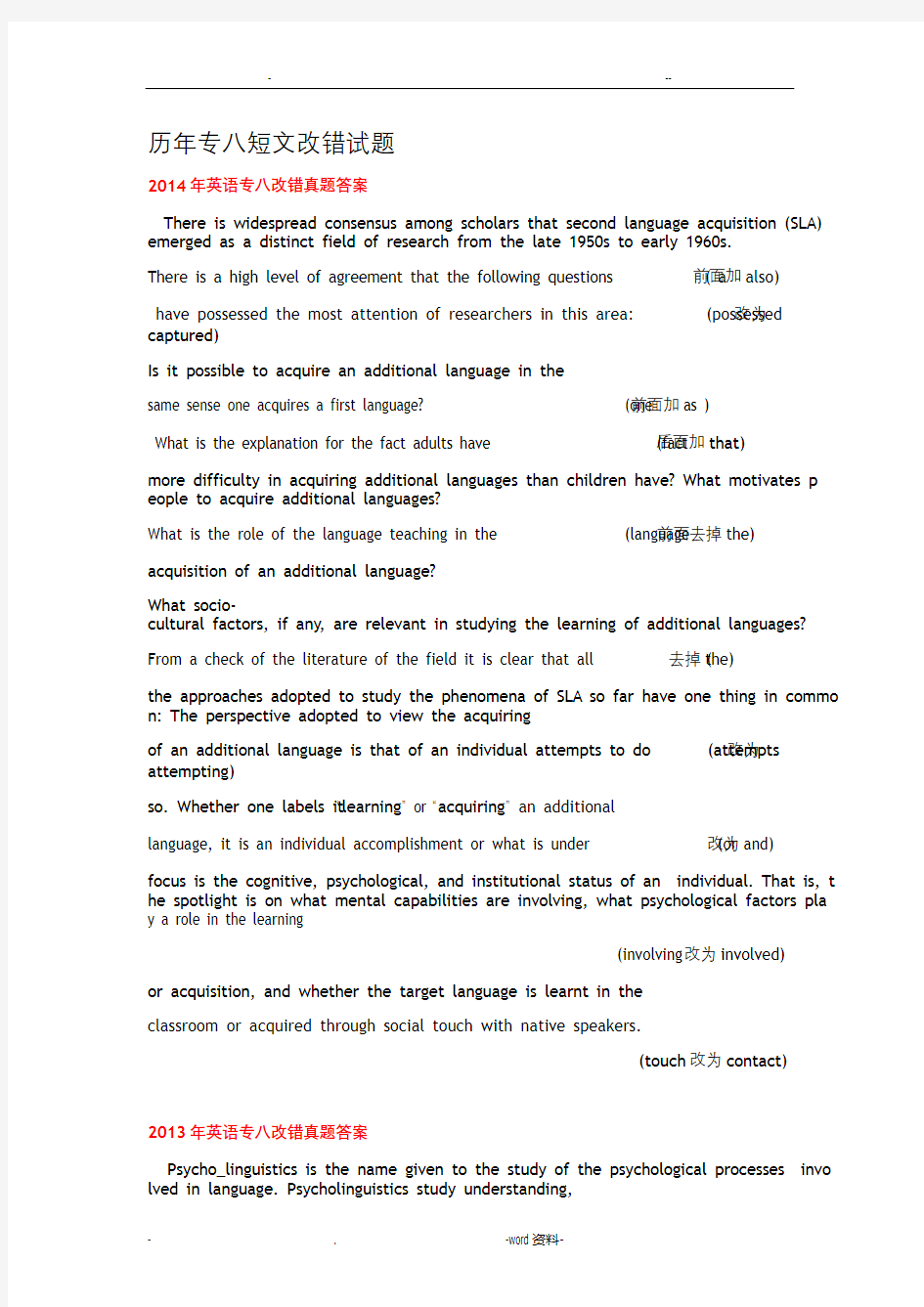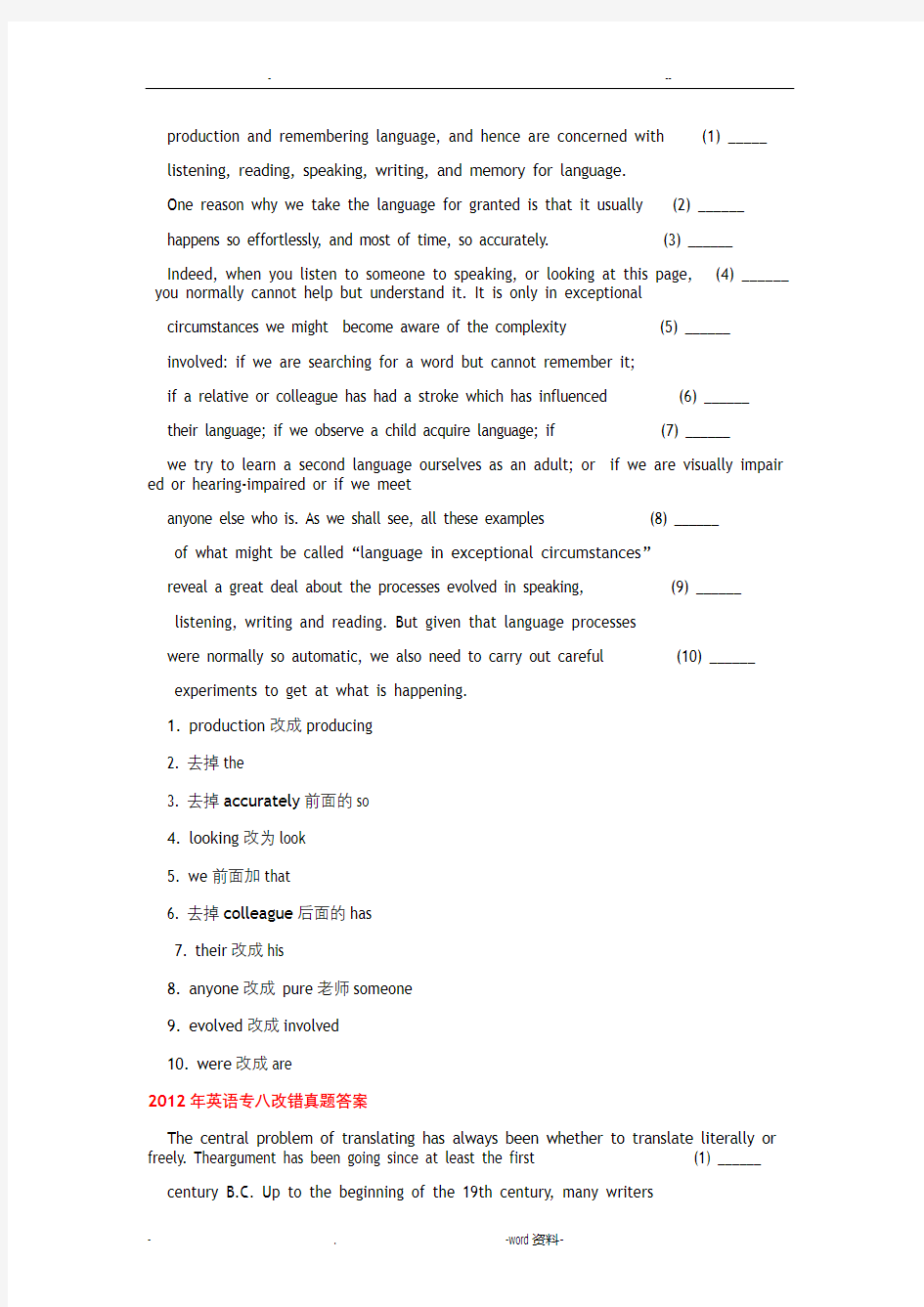历年英语专八改错真题


历年专八短文改错试题
2014年英语专八改错真题答案
There is widespread consensus among scholars that second language acquisition (SLA) emerged as a distinct field of research from the late 1950s to early 1960s.
There is a high level of agreement that the following questions ( a 前面加also) have possessed the most attention of researchers in this area: (possessed 改为captured)
Is it possible to acquire an additional language in the
same sense one acquires a first language? (one前面加as )
What is the explanation for the fact adults have (fact后面加that) more difficulty in acquiring additional languages than children have? What motivates p eople to acquire additional languages?
What is the role of the language teaching in the (language前面去掉the) acquisition of an additional language?
What socio-
cultural factors, if any, are relevant in studying the learning of additional languages?
From a check of the literature of the field it is clear that all (去掉the)
the approaches adopted to study the phenomena of SLA so far have one thing in commo n: The perspective adopted to view the acquiring
of an additional language is that of an individual attempts to do (attempts改为attempting)
so. Whether one labels it “learning” or “acquiring” an additional
language, it is an individual accomplishment or what is under (or 改为and) focus is the cognitive, psychological, and institutional status of an individual. That is, t he spotlight is on what mental capabilities are involving, what psychological factors pla y a role in the learning
(involving改为involved) or acquisition, and whether the target language is learnt in the
classroom or acquired through social touch with native speakers.
(touch改为contact)
2013年英语专八改错真题答案
Psycho_linguistics is the name given to the study of the psychological processes invo lved in language. Psycholinguistics study understanding,
production and remembering language, and hence are concerned with (1) _____ listening, reading, speaking, writing, and memory for language.
One reason why we take the language for granted is that it usually (2) ______ happens so effortlessly, and most of time, so accurately. (3) ______ Indeed, when you listen to someone to speaking, or looking at this page, (4) ______ you normally cannot help but understand it. It is only in exceptional circumstances we might become aware of the complexity (5) ______
involved: if we are searching for a word but cannot remember it;
if a relative or colleague has had a stroke which has influenced (6) ______ their language; if we observe a child acquire language; if (7) ______
we try to learn a second language ourselves as an adult; or if we are visually impair ed or hearing-impaired or if we meet
anyone else who is. As we shall see, all these examples (8) ______
of what might be called “language in exceptional circumstances”
reveal a great deal about the processes evolved in speaking, (9) ______ listening, writing and reading. But given that language processes
were normally so automatic, we also need to carry out careful (10) ______ experiments to get at what is happening.
1. production改成producing
2. 去掉the
3. 去掉accurately前面的so
4. looking改为look
5. we前面加that
6. 去掉colleague后面的has
7. their改成his
8. anyone改成 pure老师someone
9. evolved改成involved
10. were改成are
2012年英语专八改错真题答案
The central problem of translating has always been whether to translate literally or freely. Theargument has been going since at least the first (1) ______ century B.C. Up to the beginning of the 19th century, many writers
favoured certain kind of “free” translation: the spirit, not the letter; the (2) ___ __ sense not the word; the message rather the form; the matter not (3) ______ _
the manner. This is the often revolutionary slogan of writers who (4) _______ wanted the truth to be read and understood. Then in the turn of 19th (5) _____ century, when the study of cultural anthropology suggested that
the linguistic barriers were insuperable and that the language (6) _______
was entirely the product of culture, the view translation was impossible (7) ____ __ gained some currency, and with it that, if was attempted at all, it must be as (8) __ ___ literal as possible. This view culminated the statement of the (9) _______
extreme “literalists” Walter Benjamin and Vladimir Nobokov. The argument was the oretical: the purpose of the translation, the nature of the readership, the type of the t ext, was not discussed. Too
often, writer, translator and reader were implicitly identified with
each other. Now, the context has changed, and the basic problem remains. (10) __ _
1.going后加on
2. 2. certain改为a certain
3. 3. rather改为not
4. 4. is 改为was
5. 5. in 改为 at
6. 6. 去掉第二个the
7.7. view后面加that
8. 8. 去掉 was
9. culminated后面加in
10. and 改为but
2011年英语专八改错真题答案
From a very early age, perhaps the age of five or six, I knew
that when I grew I should be a writer. Between the ages of about 1_________ _ seventeen and twenty-four I tried to abandon this idea, but I did so with the conscience that I was outraging my true nature and that 2_________ __ soon or later I should have to settle down and write books. 3__________ _ I was the child of three, but there was a gap of five years 4__________ on either side, and I barely saw my father before I was eight. For this and other rea sons I was somewhat lonely, and I soon developed
disagreeing mannerisms which made me unpopular throughout my 5____________ _ schooldays. I had the lonely child's habit of making up stories and
holding conversations with imaginative persons, and I think from 6_________
the very start my literal ambitions were mixed up with the feeling of 7________
being isolated and undervalued. I knew that I had a facility with words
and a power of facing in unpleasant facts, and I felt that this created 8________
a sort of private world which I could get my own back for my failure 9________
in everyday life. Therefore, the volume of serious — i.e. seriously 10________
intended _ writing which I produced all through my childhood and boyhood would n ot amount to half a dozen pages. I wrote my first poem at the age of four or five, my mother taking it down to dictation.
1.在grow后加up, 考固定短语
2. 改consience为consciousness 考词语区别,consience翻译为“良心,道德心”, consiousness翻译为“意识”
3.改soon为sooner,sooner or later是固定短语
4. 在child前加middle, 考上下文理解。作者是三个孩子句中的那位
5 。改disagreeing 为disagreeable ,disagreeing只能作动名词,不能作形容词。disagreeable mannernisms 令人讨厌的习惯
6.改imaginative为imaginary, 考词语区别 imaginative翻译为“有想象力的”,imaginary翻译为“想象的,虚构的”
7. 改literal 为literary , 考词义区别, literal翻译为“字面的”,literary 翻译为“文学方面的”
8.去掉face后的in,face接宾语时是及物动词。考动词的基本用法
9.在world后加in或者改which为where, 考定语从句
10.改Therefore为However或者Nevertheness, 考语境。
2010年英语专八改错真题答案
So far as we can tell, all human languages are equally
complete and perfect as instruments of communication: that is,
every language appears to be well equipped as any other to say 1___________ the things their speakers want to say. 2__________ T here may or may not be appropriate to talk about primitive 3_____________p eoples or cultures, but that is another matter. Certainly, not all groups of people are e qually competent in nuclear physics or
psychology or the cultivation of rice . Whereas this is not the 4_____________ fault of their language. The Eskimos , it is said, can speak about
snow with further more precision and subtlety than we can in 5___________ _ English, but this is not because the Eskimo language (one of those sometimes miscal led 'primitive') is inherently more precise and
subtle than English. This example does not come to light a defect 6___________ _ in English, a show of unexpected 'primitiveness'. The position is
simply and obviously that the Eskimos and the English live in similar 7____________ environments. The English language will be just as rich in terms 8____________ for different kinds of snow, presumably, if the environments in which Englishwas habitually used made such distinction as important. 9___________ Similarly, we have no reason to doubt that the Eskimo language could be as precise an d subtle on the subject of motor manufacture
or cricket if these topics formed the part of the Eskimos' life. 10__________
1 .be后插入 as; as…as引导的比较级
2 .their改为its; its代替every language
3 .There改为It; It此处作为形式主语,真正的主语是后面的不定式
4 .Whereas改为But ;语境需要表示转折的连词,whereas表示对比
5. further 改为much further不能修饰比较级
6 .come改为
bring; (sth)come to light , bring sth to light bring to light the defect of English =bri ng the defect of english to light 揭示英语的缺陷
7. similar改为different; 根据语境应该用different
8. will改为would; 虚拟语气
9 .as important去掉as;
10 the part去掉the或者改the为a be/become/form (a) part of 是固定短语2009年英语专八改错真题答案
The previous section has shown how quickly a rhyme passes
from one school child to the next and illustrates the further difference (1)___ _ between school lore and nursery lore. In nursery lore a verse,
learnt in early childhood, is not usually passed on again when the (2)____ _little listener has grown up, and has children of their own, or even (3)_______ __ grandchildren. The period between learning a nursery rhyme and transmitting it may be something from twenty to seventy years. With (4)_____ _ the playground lore, therefore, a rhyme may be excitedly passed (5)______ _ on within the very hour it is learnt; and in the general, it passes (6)______ __ between children of the same age, or nearly so, since it is uncommon for the differ ence in age between playmates to be more than five years. If ,therefore, a playground rhyme can be shown to have been
currently for a hundred years, or even just for fifty, it follows that it (7)_____ _has been retransmitted over and over; very possibly it has passed (8)________ _ along a chain of two or three hundred young hearers and tellers, and the wonder is that it remains live after so much handling, (9)______ to let alone that it bears resemblance to the (10)_______
答案分析:
(1) the further difference改为a further difference(此次应该用不定冠词表示泛指)
(2) 改when 为until, 结构not...until翻译为“直到……才”
(3)their改为his(代词与前文a little listener在单复数上保持一致)
(4)something 改为anything 此处指二十到七十的任何时段
(5)therefore改为however (根据上下文逻辑关系)
(6) in the general去掉the (习惯用法in general 表示总的来说,一般不用冠词)
(7) currently 改为current (这里起的是表语的作用,需要形容词而不是副词)
(8) it has passed改为 it has been passed (与分号前的被动保持一致)
(9) live 改为 alive alive翻译为“鲜活的”,一般作补语;live翻译为“现场转播的;活的”,一般作定语
(10) to let alone改为 let alone (let alone 为习惯搭配,意思是“更不用说
2008年英语专八改错真题答案
The desire to use language as a sign of national identity is a
very natural one, and in result language has played a prominent ____1____ part in national moves. Men have often felt the need to cultivate ____2____
a given language to show that they are distinctive from another ____3____
race whose hegemony they resent. At the time the United States ____4____ split off from Britain, for example, there were proposals that
independence should be linguistically accepted by the use of a ____5____ different language from those of Britain. There was even one ____6____ proposal that Americans should adopt Hebrew. Others favoured the adoption of Gre ek, though, as one man put it, things would
certainly be simpler for Americans if they stuck on to English ____7____ and made the British learn Greek. At the end, as everyone ____8____ knows, the two countries adopted the practical and satisfactory
